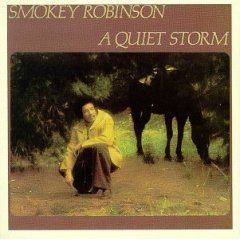Critical reception
A Quiet Storm is one of the most highly-acclaimed soul albums of the 1970s. This album spawned three hit singles, including Robinson's first disco hit "Baby That's Backatcha", rising to number 7 on the Billboard Disco chart (Top 10 R&B). The album re-established Robinson's reputation as a master songwriter and producer and solidified his solo success after leaving his influential Hall of Fame group, the Miracles.
In a contemporary review for Rolling Stone , Robert Palmer said A Quiet Storm proved Robinson was "still a dynamic creative force" as it succeeded on the strength of his singing and production, although he highlighted the "sexy directness" of the title track and "Baby That's Backatcha". [7] Vince Aletti ranked it as the year's third best album in his ballot for the 1975 Pazz & Jop critics poll. [8] Robert Christgau was less enthusiastic, believing the title track was somewhat bold for concentrating Pure Smokey 's "drift into a style", but finding much of the record lacking rhythm, with the exception of "Love Letters" and "Coincidentally". [4]
A Quiet Storm was later named one of the greatest Motown albums of all time in a 1999 edition of Q . [9] According to Pitchfork journalist Eric Harvey, the record reinvented Robinson's brand of "contemplative romantic soul" with the Miracles, revitalized his career after two underperforming solo albums, and typified what would become known as the quiet storm radio format. [2]
Miracles member Marv Tarplin was also a contributor to this album.
This page is based on this
Wikipedia article Text is available under the
CC BY-SA 4.0 license; additional terms may apply.
Images, videos and audio are available under their respective licenses.
